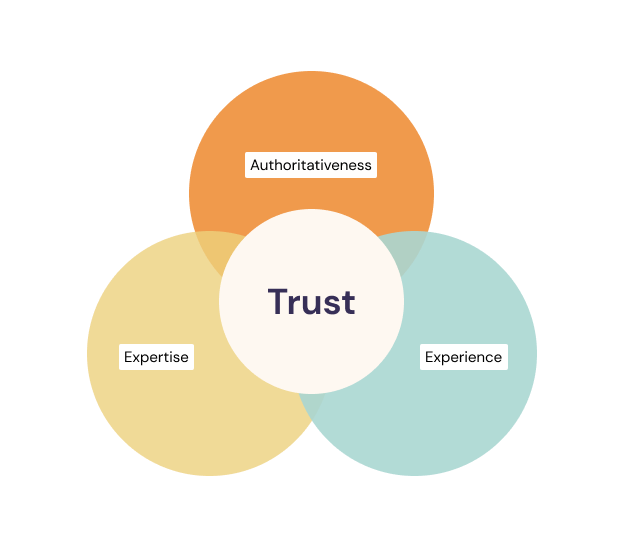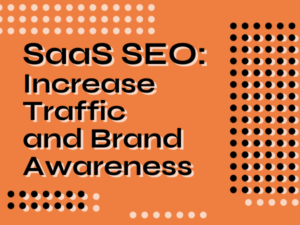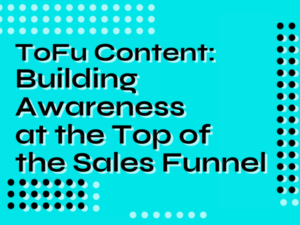E-E-A-T is a term used in the SEO world to refer to Experience, Expertise, Authoritativeness, and Trustworthiness (or simply: Trust). It serves as a criterion for assessing the content quality and credibility of websites.
In simpler terms, E-E-A-T guides you on how to showcase your knowledge and expertise – a key factor Google looks for in content to deem it high-quality and recommend it to users.
To understand it in more detail, it’s essential to look at each element on its own, as well as in relation to one another.
In this article, we will do just that. We’ll explore what each component means, how they are related, and why E-E-A-T is so important for SEO. Read on to make sure your content always matches the quality rater guidelines.
- E-E-A-T stands for Experience, Expertise, Authoritativeness, and Trustworthiness – these are the elements that Google uses to assess the quality and credibility of a website’s content.
- E-E-A-T is not a direct ranking factor, but it can influence SEO performance as Google’s algorithms take into account the credibility and trustworthiness of content when assessing page rankings.
- Google’s E-E-A-T guidelines are particularly stringent for YMYL (Your Money or Your Life) content – pages with content that could have an impact on the well-being and safety of users if inaccurate, misleading, or harmful.
- Improving the components of E-E-A-T (creating quality content, showcasing expertise, and building authority and trust) can help improve SEO performance. This may involve working with industry experts, implementing a solid link-building strategy, and increasing brand awareness through social media and PR outreach.
Components of E-E-A-T
According to Google’s Search Quality Rater Guidelines:
This means that E-E-A-T is closely related to signals that Google uses to evaluate content quality and assess the page’s credibility.
Google is proactively tackling the challenge of content tailored mainly for high search engine rankings rather than its quality. These guidelines provide Google with an effective strategy to manage this issue.

This also points to YMYL content – the content that is exceptionally sensitive, such as health advice. We will explain it later, but now let’s focus on what Google says about each of the E-E-A-T components and what they mean for your SEO strategy.
What Is Expertise?
Expertise refers to a person’s knowledge and skills in a particular subject or field. It all boils down to this question: does the person have any expertise in the subject they speak about?
Google uses this example:
In other words, you want to make sure that the content on your website is written (and authored) by someone with, well, proven expertise.
This means they should have an extensive understanding of the topics related to their industry or business, as well as be able to explain them clearly and concisely.
More importantly, they should be a recognized expert.
Appearing in other sources allows Google to evaluate their experience and expertise outside that presented in your content, further proving their worth.
Conversely, if that person doesn’t have any online presence, it could make it more challenging to achieve the highest levels of E-E-A-T on your website.
For example, if you are running a website about financial planning and investment, you want to make sure that the content is authored by someone who has experience in the industry, i.e., a certified financial planner.
They should be able to provide clear and reliable information backed by research and data. This will create more confidence in the content and help boost its SEO value.
You can showcase expertise through various methods, such as:
- including credentials like certifications or degrees on any page where you feature a person’s bio,
- citing relevant sources throughout the article,
- featuring interviews with experts in a particular field,
- providing links to third-party sites that demonstrate credibility,
- displaying awards or recognitions you may have received for excellence in your niche.
All of these factors, combined with other elements of E-E-A-T, will contribute towards making sure search engine algorithms recognize your site as a high-quality and trustworthy source of information.
What Are Black Holes? – this rather casual article explains one of the most talked about subjects in physics in the last decade. Although the author, Francis J. Reddy, is only a senior science writer, the article itself links to numerous scientific sources – as if being posted on nasa.gov wasn’t enough proof of expertise.
What Is Experience?
The Experience element was added to the concept of E-A-T in Google’s search rater guidelines in December 2022 as a way of assessing the first-hand experience with the subject or life experience for the topic.
‘Wait, isn’t it what expertise is about?’ you may ask, and this is a valid question to ask here.
Expertise focuses on formal experience, that is, the author’s education, work experience, and so on – everything that makes them an expert in this field.
Experience (the E-E-A-T component) is about the experience the author may have without any formal preparation. Google added an extra E specifically to make this distinction – it is especially important for sensitive YMYL topics. Those examples should make it more clear:
- A health and fitness influencer can have experience in maintaining mental well-being, but only a medical doctor specializing in psychology will have the expertise to talk about therapy and drugs used to treat mental health issues (YMYL Health or Safety).
- Achievement stories of first-time homeowners sharing their tips on mortgages on a public forum will share experience, while a tutorial from a certified financial advisor will be backed by expertise (YMYL Financial Security).
- A detailed blog post about starting a company written by the company owner will rely on experience, and to find expertise on this topic, you will have to look for respective government websites (YMYL Society).
Google states that experience and expertise (and also authoritativeness) may overlap. Those terms only help Google quality raters to assess the overall quality of a given website – E-E-A-T signals are not clearly defined rules you can just tick on your checklist, but rather general guidelines regarding creating and rating content.
Building your experience for SEO is quite similar to building your expertise, with the difference being that, again, your experience doesn’t have to be formal. So, this includes:
- sharing relevant personal experiences and stories that demonstrate your understanding of the topic,
- offering practical advice and insights gained from your real-world knowledge,
- showing you using products, being in the field, or engaging in relevant activities,
- participating in discussions and events related to your field.
What We Can Learn from Chimpanzees and How We Can Apply it to Business – this post from Robert Bluestein talks about how the behaviors of chimpanzees can be translated to those of humans in the workplace. Although Bluestein is not a primatologist, he talks about his years of experience working with them as a volunteer – and backs it up with his photos (dating back to 2002).
What Is Authoritativeness?
Authoritativeness is a term used to describe the degree to which a website or content creator is seen as a go-to source of information. This can be achieved through various means, such as:
- being recognized by other experts in the same field,
- having written for well-known publications and websites,
- participating in industry events and seminars,
- conducting surveys, polls, and interviews that involve relevant stakeholders from different sectors, etc.,
- being recognized as the official source for certain topics.
Essentially, when it comes to authoritativeness, you want your website or brand to be seen as reliable and trustworthy by both search engines (Google) and readers.
A key indicator of this is external links pointing back to your website from other well-respected sources like government bodies, universities, or established news outlets. Having these types of links will prove that you have credibility within the industry – something Google is looking for when determining how much weight should be assigned to your site during ranking calculations.
Why the Pixel 8’s Face Unlock upgrade is a big deal – this piece from Mishaal Rahman is a good example of high authoritativeness. Rahman has authored countless articles reporting on everything related to Android, and with over six years of writing for XDA Developers (one of the largest websites in that niche), he became a household name for anyone interested in the latest smartphone news.
Other factors that contribute towards increasing authoritativeness include:
- providing reviews with detailed ratings on products/services related to your niche topic area,
- curating online discussion groups where people can come together around a shared interest,
- publishing press releases highlighting any recent developments concerning your company, etc.
All these activities show that there’s some level of credibility associated with what you do – something highly valued by search engine algorithms.
So, having a Google business profile and keeping it up-to-date can already push you towards good E-E-A-T!
What Is Trustworthiness?
Trustworthiness is a measure of how much confidence readers have that the content they’re reading on your website is accurate, honest, safe, and reliable.
This could be in terms of factual accuracy, opinion pieces, or any other type of content you might produce.
Otherwise, the quality rater could assign high level of E-E-A-T to suspicious websites because the content quality and expertise outweigh trust.
The effect of trust on SEO is rather clear. Search engine algorithms take user sentiment into account when deciding on ranking. High user trust and strong E-E-A-T means high user retention and a low bounce rate.
To increase trustworthiness, you should focus on creating quality content that provides valuable information to readers. This is where your expertise and experience come into play.
For instance, if you are writing articles about financial planning and investment advice, then it would be beneficial if these were backed up with research from credible sources, such as government agencies or established finance websites like Investopedia.
Another way to ensure trustworthiness stems from authoritativeness. Being transparent about who the authors of your content are and why they should be considered experts can significantly impact your site’s E-E-A-T.
You should also include links back to reputable sites to showcase credibility while helping improve SEO performance at the same time.
Finally, you need to make sure that your website is trustworthy on its own. This means the context your content is put in.
What is visible on your page besides the main content? Is there any additional info that could make it more trustworthy, such as a feedback section? Maybe you could further prove your trustworthiness with clear customer service information or relevant certificates?
While at it, see if your website looks trustworthy in general. If there is anything that could raise suspicion, a page will likely receive low E-E-A-T.
Vitamin C description from Mayo Clinic Drugs & Supplements library – this is a perfect example of YMYL content – it is directly related to health. The text explains the topic in a thorough but concise manner, it lists references, and points at the authority Mayo Clinic has.
What Is YMYL and How Does It Relate to E-E-A-T?
YMYL stands for Your Money or Your Life. It is a term used by Google to refer to web pages related to topics that could have an impact on the well-being and safety of users if the information provided is inaccurate, misleading, or purposely harmful.
Google lists four YMYL topic types:
- YMYL Health or Safety: Topics that could harm mental, physical, and emotional health or any form of safety, such as physical safety or safety online.
- YMYL Financial Security: Topics that could damage a person’s ability to support themselves and their families.
- YMYL Society: Topics that could negatively impact groups of people, issues of public interest, trust in public institutions, etc.
- YMYL Other: Topics that could hurt people or negatively impact the welfare or well-being of society.
As such, Google’s quality rater guidelines are particularly stringent when it comes to these types of pages – especially clear YMYL pages. Those refer to topics that leave no doubt about their impact on people’s health, safety, or welfare.
Google also leaves a potential YMYL category for content that may not be sensitive directly, i.e., weather forecasts – in most cases, slightly inaccurate information will not cause harm.
It’s important to note that YMYL isn’t just restricted to the categories mentioned above; other sectors, like news sites, can also fall under YMYL depending on how they present their content and whether it meets certain transparency requirements set out by Google.
E-E-A-T and SEO
Though E-E-A-T is not a direct ranking factor, as there aren’t any reliable metrics to measure these qualities, it is still important when it comes to SEO.
Google’s algorithms take into account the credibility and trustworthiness of content when assessing page rankings.
However, high E-E-A-T content also aligns with other SEO ranking factors.One such instance is the Google Helpful Content Update. With this update, Google is trying to put even more emphasis on content that is helpful to the readers. Many of the signals Google uses to measure this align with E-E-A-T signals.
For instance, your experience with a given product makes your review more trustworthy, which, in turn, increases relevant metrics and makes your content appear more valuable to Google.
It’s worth noting that while the search quality rater program relies primarily on manual action from human raters, Google’s classifier process is completely automated and relies on machine learning. This is why you should have E-E-A-T in mind even when working on the less important parts of your website.
How to Improve Your SEO With E-E-A-T
To ensure your website performs well in SEO, you need to focus on improving all aspects of E-E-A-T: Experience, Expertise, Authoritativeness, and Trustworthiness. There are various ways to do this, and below, we’ve outlined the main steps you should take.
Focus on Creating Quality Content
It goes without saying that the content on your website should be accurate, transparent, and of a high standard.This includes providing clear sources and references where necessary, as well as making sure any information presented is up-to-date – this will help reassure visitors that they can trust what they’re reading.
Whenever creating content, consider the user experience – is it easy to read and understand? Does it provide direct answers to questions visitors might have?
You may also want to include features like polls or surveys so readers can give their opinions on topics related to your industry. Doing this not only gives you valuable feedback but also shows that you’re listening and responding appropriately.
And don’t forget about the comments section, too. It is an excellent way for visitors to leave their thoughts and opinions (that you can respond to), which can be beneficial in building trust over time.
Work With Industry Experts
If you’re looking to create content for your website that demonstrates expertise, you may want to work with people who have experience in the industry.
This could include inviting experts to write or cooperate on topics related to your niche area or hiring freelance writers with backgrounds in finance, marketing, technology, or whatever field is most relevant to your website.
You don’t need to only put your staff as authors of your content. Guest posting is a valid tactic, and what’s more, it can help both you (the publisher) and the writer increase your ranking.
Develop a Solid Link-Building Strategy
Link-building is a crucial part of SEO, as it shows Google that you’re seen as an authoritative source within your industry. Having links from other reputable websites pointing back to yours will help boost trust in your content, thus leading to better SERP rankings over time.
When creating a link building strategy, focus on acquiring links from high-quality sources like government bodies, universities, or established news outlets – these are the types of sites that Google considers when assessing E-A-T signals and page rankings.
As it’s a time-consuming process that requires true dedication and resources, consider partnering with a reputable agency that will be able to provide you with the necessary expertise and knowledge in this area.
Here at NoN Agency, we specialize in link-building strategies that focus on domain authority and trustworthiness through organic methods.
Increase Brand Awareness Through Social Media and PR Outreach
Social media channels such as Facebook, Twitter, Instagram, etc., are great tools for increasing brand awareness among target audiences. You should make sure that your content authors are available there as well.
By creating accounts on various sites and posting regularly with content relevant to your niche topic area (e.g., industry news updates, insights, informative posts), you can build a community around what you do – something that can build your trust in the eyes of Google!
Additionally, consider publishing content on other platforms, such as Medium or LinkedIn, and guest-blogging for other websites in your area of interest.
Doing this will help create more exposure for your brand and drive direct traffic back to your website. It will also help you build relationships with potential customers or industry experts who may be able to provide valuable insight into current trends.
Lastly, don’t forget about press releases, either. Notifying journalists about any new developments regarding your company could lead to increased coverage in major publications which helps boost authoritativeness levels.
Monitor User Sentiment Through Feedback
As we mentioned earlier, user sentiment plays a vital role in SEO performance.
This is why it’s important to keep track of customer feedback on a regular basis; by doing this, you can gauge whether people are satisfied with the content you provide and make any necessary changes if needed.
You may want to consider setting up review or rating systems for products or services related to your niche topic area as well.
Having these visible on your website shows visitors that others have found what they’re offering useful, thus creating more trustworthiness over time.
Respond to Feedback (Especially Negative)
No matter how well you’ve optimized your website for E-E-A-T, there will always be people who don’t feel happy with their experience.
Respond quickly and professionally to any negative feedback or comments that are left on your site! This shows Google (and potential customers) that you take the issue seriously and are looking to fix any problems quickly.
Moreover, responding in a timely manner can help boost overall trustworthiness scores. If someone has taken the time to contact you directly about an issue they experienced while browsing your website, then it speaks volumes if you reply back in under 24 hours (as long as they spread the word about it – which is why reviews are vital!)
This will also demonstrate that customer service is a priority for your brand – something again highly valued by search engine algorithms when calculating page rankings!
Look for Brand Mentions & Citations
Finally, it’s essential to monitor for any brand or author mentions and citations online.
Any mention outside your website adds to the overall digital PR of your brand, signaling to Google that you are a trustworthy source of information.
To search for these types of references, you can use the Google Alerts tool. It sends notifications whenever your business name appears on web pages or within articles – this way, you can stay up-to-date with what people are saying about you online!
Alternatively, there are many third-party tools available that will track down mentions as well; whatever option you go with, just ensure that all responses adhere to E-E-A-T principles: providing helpful information while maintaining a high level of expertise throughout. Mentions on toxic websites can have the opposite effect!
Wrapping Up
At the core, these four key elements – Experience, Expertise, Authoritativeness, and Trustworthiness – go beyond the usual SEO elements. But, it doesn’t mean that E-E-A-T is not important for SEO.
This set of guidelines from Google might help you improve your content quality and suggest new ways of developing your digital PR. Those two can already increase your search ranking!
Remember, though, that SEO is an ongoing process and requires dedication and resources – there’s no quick fix!
However, if you’re willing to put in the necessary time and effort into optimizing for E-E-A-T, then you should start seeing positive results over time.






![Google March 2024 Core Update: What we know so far? [Don’t Panic]](https://non.agency/wp-content/uploads/2024/03/google-march-2024-core-update--300x225.png)



